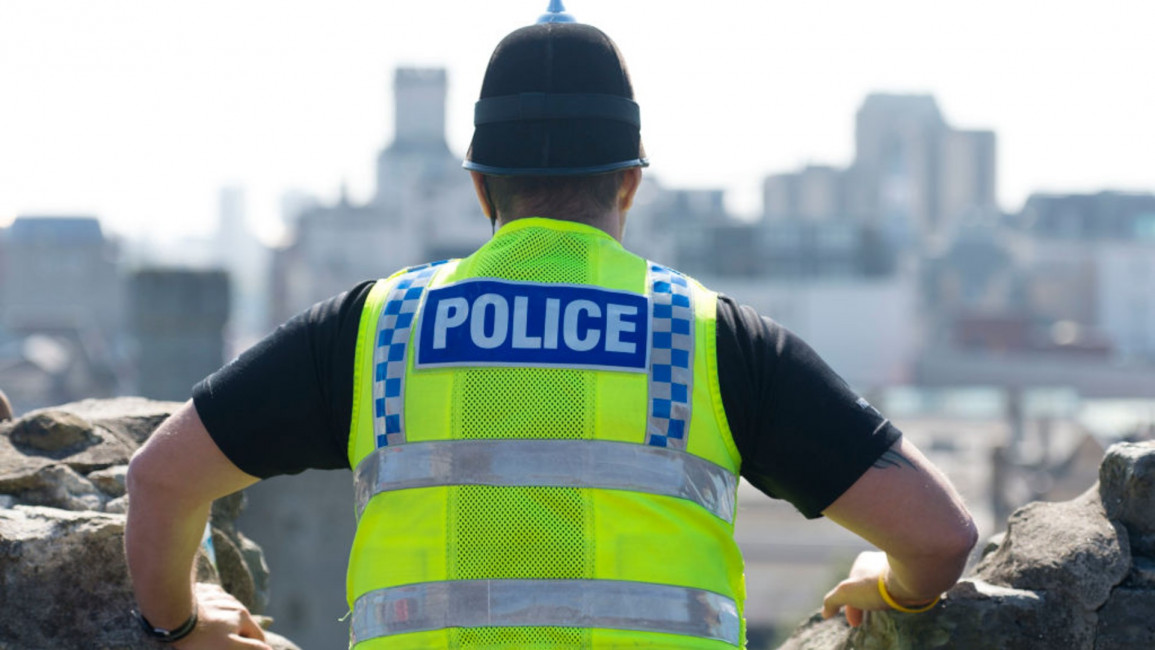
Dropping the word 'jihadi' won't fix an inherently racist UK police
So, after two decades of the War on Terror, the institutionalising of islamophobic practices in the name of "preventing" extremism and the targeting of Muslims - some as young as 3-years old - the police wants to engage in a conversation on the weight of racist terminology.
No fundamental challenge to any of the practices from within the ranks of the Muslims in blue appears to be on the horizon, however.
For many years, certain forms of state violence have been practiced and justified by the scapegoating of Muslims. A mixture of orientalist tropes and imperialist dehuminisation have facilitated the so-called fight against terrorism. This war of terror has also been the cover for a much wider attack on political dissent, and civil liberties more broadly.
Twenty years of wars waged in Muslim countries, of Muslims at home being presented as "suspect" and innately violent, of policy after policy voted in to reinforce the othering and targeting of the community, of thousands of civil servants trained to spy on Muslims, and of an unrelenting attack on our religious, political, and civil rights.
 |
All of this is ultimately empty. It will not undo a political agenda that depended on the demonisation of Muslims |  |
It's hard to know whether to laugh or feel enraged by the news that the police are suddenly worried about the weight of particular terms in serving a racist narrative.
Let us be clear, the state has very loudly and proudly organised, institutionalised, and reproduced the racist propaganda that has put Muslims in the firing line. In fact, it was their fire and their line! The violence is also not limited to the police - it extends well beyond one specific state institution into official spaces like borders, prisons, social services, healthcare, schools and universities.
Mainstream media also has a considerable part to play of course, while the far-right in the streets has been both bolstered by this official cover, and mobilised by politicians and pundits to justify further racist policies to respond to the "legitimate concerns" of a mythical "white working class".
Twitter Post
|
Not only is this sudden concern raised from the ranks of the police incredibly patronising - when Muslims, lawyers, activists, journalists, students, teachers, healthcare professionals, MPs, to name but a few have long raised this alarm - but frankly, it's disingenuous.
Interrogating the impact of words means little if the policies which legitimise loaded terms and racist ideologies related to Muslims continue to exist. As long as the Prevent agenda, for example, isn't dismantled in its entirety, it doesn't matter whether the police is spying on, interrogating and arresting people using the proposed alternative label of "faith-claimed terrorism" or islamist jihadism. Muslims will still be unjustifiably and disproportionately profiled and targeted.
Read more: UK Muslim police group campaigns to drop 'jihadi' terminology to enhance community relations
It is both a vacuous media stunt and yet another insult to the intelligence of Muslims across the UK. This sort of PR-stunt has come up time and time again in the discourse of politicians, through show "reviews" and inquiries into the Prevent agenda, or through the attempts at setting up smoke screens by counter-extremism advocates who like to bring up the white far-right members who have been interrogated also.
If any reclaiming of words like "jihad" - which means struggle, is mostly used within Islamic theology, and has a wide variety of meanings in this context - is to take place, it certainly wouldn't start with the police. In fact, its misuse by the state and the right has long been addressed by community activists and advocates including former Guantanamo detainee, Moazzam Begg.
When almost a decade ago, he raised issues such as the co-option of terms, like "jihad", public outrage and hysteria soon followed. Even among sections of the left there was an uneasy sense that he "went too far". Yet, in 2020 the police themselves are unpacking such a supposedly radical question.
All of this is ultimately empty. It will not undo a political agenda that depended on the demonisation of Muslims, and a public discourse that conjured the face of a racialised man with a beard, or a woman wearing a hijab each time repressive measures were introduced for the protection of a mythical security.
It is all too little and, far, too late. The state has sealed and strengthened the hatred and marginalisation of Muslims. You can rename and reword but the damage has already been done.
 |
You can rename and reword but the damage has already been done |  |
We demand material and structural justice, change, and official recognition of the crimes committed by the state. We demand public lists of those involved in black torture sites, "de-radicalisation" camps, and the development of policies like Prevent.
We demand public accountability led by those who have fought and opposed the War on Terror throughout. We demand, in a word, liberation, which no cop - however Muslim they might be - will ever deliver for us. We will need to fight for it, and claim it for ourselves.
Follow her on Twitter: @MaliaBouattia
Have questions or comments? Email us at: editorial-english@alaraby.co.uk
Opinions expressed in this article remain those of the author and do not necessarily represent those of The New Arab, its editorial board or staff.



